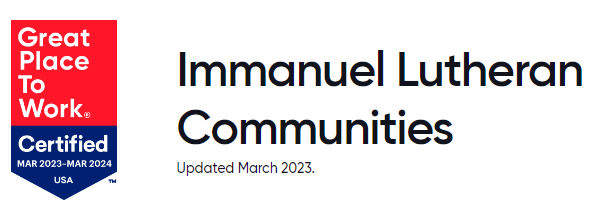
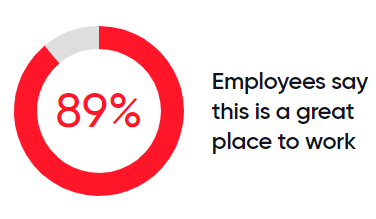

GREAT PLACE TO WORK CERTIFIED 2023-2024
WE are thrilled to be recognized once again as a Great Place to work. We’re even more thrilled to have scored higher than last year, with an 89% satisfaction rate.
Immanuel Lutheran Communities is the only Life Plan Community in northwest Montana serving the older adult population. As a not-for-profit LPC, we offer retirement choices that embrace a philosophy of dignified care for the whole person. Our community offers the full spectrum of care from independent and assisted living, memory care, post-acute care and skilled nursing.
Company Culture at Immanuel Lutheran Communities
The employee experience below at Immanuel Lutheran Communities, compared to a typical company.
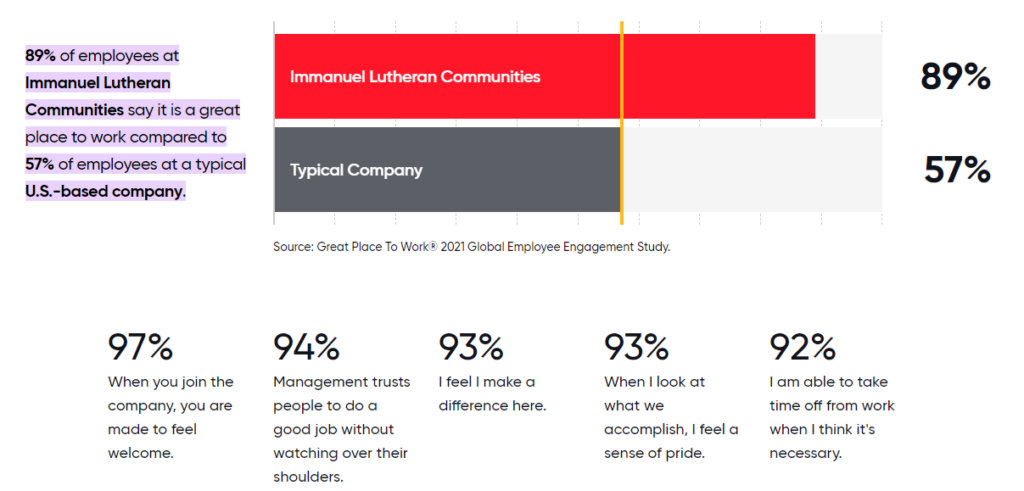

Why Work at Immanuel Lutheran Communities?
See what employees say about what makes Immanuel Lutheran Communities a great workplace. These words are drawn from employee comments on the Trust Index™ survey.
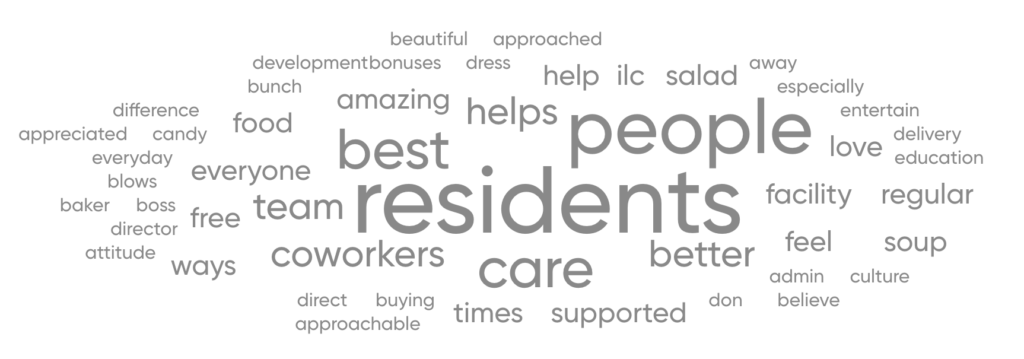


For the full article, click here: Great Place to Work – Immanuel Lutheran Communities
For many people, homeownership stands as one of life’s true joys. But what happens when maintaining a home begins to feel like a chore?
If you enjoy owning your home, you may not have considered a move to a new cottage on the campus of a Life Plan community. Once you begin looking into the advantages, you may find an overwhelming amount of information. To help simplify your search, we’ve created this brief primer on the top five things to know about cottage living on the campus of a Life Plan community.
1. You’ll Enjoy a Low-Maintenance Lifestyle
How do you plan to maintain your independence and vitality in the future? If you prefer a low-maintenance lifestyle that does not include household chores — one that gives you plenty of time for the activities you enjoy — an independent living cottage may meet your needs.


In an independent living cottage, you trade the significant responsibilities of home maintenance for beautifully landscaped grounds, access to inviting common areas and a private residence specifically decorated to your liking. On-site team members tend to the daily tasks that make a house a home, from changing light bulbs and cleaning to mowing the grass and making repairs.
When the time comes for spring cleaning, you get to continue enjoying your normal daily activities as you leave the hard work to the team members who work in the community.
2. You Choose the Floor Plan That Suits You
You may think that if you move to an independent living cottage, you will have only limited options for your residence. Nothing could be further from the truth!
In an independent living cottage, you can select from an available floor plan for the space and layout that best fit your personality and needs. In addition, The Cottages at Buffalo Hill offer two-bedroom options with new, open floor plans and modern finishes such as new stainless-steel appliances, granite countertops, and a full-size washer and drier.
Once you choose the ideal space for your needs, it’s yours to decorate as you choose with treasured furnishings and artwork.
3. You’ll Benefit From a Range of Services and Amenities
Living in an independent living cottage provides various services and amenities available right on campus. These services reduce daily responsibilities so you can spend your time with activities and people you enjoy. Landscaping, security, housekeeping, maintenance and dining are among the many services offered.


In addition, you have access to a wide range of amenities to enjoy. On-site amenities such as a library, Bistro and Lounge, heated swimming pool, garden areas, a spa and activities rooms allow you to enjoy socializing and practicing your favorite hobby. Meanwhile, you (and your family when you decide to invite them) can enjoy a delicious, chef-prepared meal in beautiful dining venues, along with stimulating workouts in the on-site fitness center.
You will also gain peace of mind from around-the-clock security personnel and security technology, so when you choose to visit your favorite vacation spot or travel to see family, you can be secure in knowing your home is still being cared for while you are gone.
4. You Need Never Feel Lonely or Bored
In your independent living cottage, you will find endless opportunities for socializing, learning, having fun and engaging with others. Your community will offer a full schedule of interesting programming, including lectures, performances, socials, discussions, courses and more.
In addition, you can build friendships by using the amenities throughout the community. If you enjoy exercise, you’re likely to meet like-minded individuals in the workout area and fitness classes. For those who enjoy engaging in stimulating conversation, you can chat with friends at dinner or invite friends to your own homemade (or take-out) dinner in your cottage.
If you consider yourself an introvert, living in a cottage offers the privacy you may crave. When you’re ready to get out and meet people, you can do so at your own pace.
Visit our photo gallery for an insight into the community and some of the residents.
5. You’ll Have Access to Additional Assistance
Even if you live in an independent living cottage, can manage all of your daily activities, and do not need frequent medical assistance, you can access additional assistance — if and when needed. In a community such as Immanuel Lutheran Communities, with a full continuum of care, you can be confident that high-quality medical care is available if your health needs should change.
When you choose an independent living cottage with a continuum of care available on the same campus, you ensure an easy transition between levels of support.
The Cottages at Buffalo Hill, on the campus of Immanuel Lutheran Communities, offers a full continuum of services along with stunning views, a beautifully landscaped campus, and a variety of services and amenities to meet the needs of the active older adult who wants to continue to enjoy life, on their own terms and at their own pace.
To schedule a visit, please contact us today to learn more.
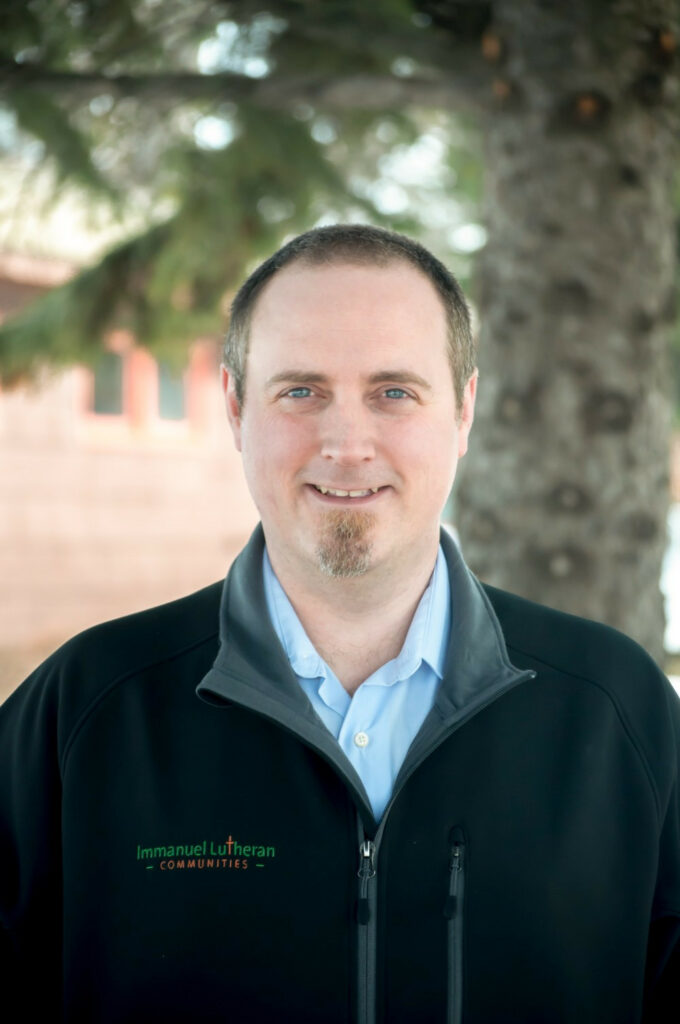

Welcome Michael!
Carla Wilton, COO welcomes Michael Weideman, LPN as the Administrator in Training for the Immanuel Skilled Care Center and The Retreat at Buffalo Hill.
Michael Weideman graduated from the University of Montana with a Bachelor’s of Science in Health and Human Performance, and a Licensure in Teaching K-12 Physical Education and Health.
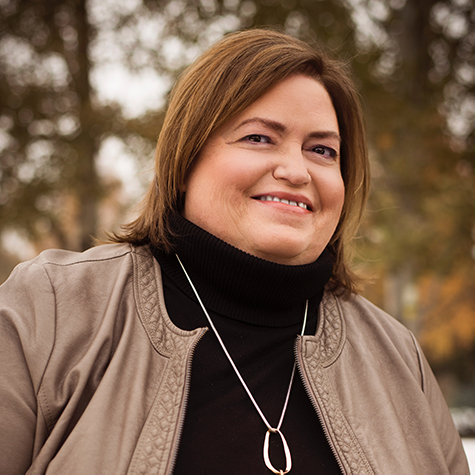

Upon moving back to the Flathead Valley in 2008, Michael started working with children who had autism for the rural schools in the Kalispell area. In 2012, Michael received his Licensure in Nursing and has been working at Immanuel Lutheran Communities ever since.
Michael has overseen Assisted Living services at Buffalo Hill Terrace as the Assisted Living Director since 2016, and in 2022 began pursuing his Nursing Home Administrator’s license to take on the role of Administrator at the Immanuel Skilled Care Center.


Nursing homes across the state are still recovering and still managing from the effects of Covid. Please take a moment to view this video from the Montana Health Care Association. All Montana nursing homes are asking for the public and most importantly our Montana lawmakers to hear how Covid has impacted our nursing homes and that more funding from the Medicaid and the American Rescue Plan Act (ARPA) is needed to help support our Montana Nursing Homes to provide the best for our Montana Older Adults who cannot care for themselves and many who have outlived their financial resources.
Individualism is something that everyone craves. Being a part of a group is always significant but being known as an individual is exceptional. That was resident and welcome committee member Frank’s goal when he decided to start carving The Twelve Apostles. These twelve men were highlighted in The Last Supper, but Frank wanted to take the time to tell each individual man’s story through his woodcarvings.
As a new airline pilot, Frank had a lot of time on his hands waiting on-call and decided he needed to spend his newly found time on a hobby. This hobby turned out to be telling stories through the art of carving wood. Frank’s “religious art phase” was exemplified through these pieces, showcasing important aspects of each individual Apostle and who they each were as individuals.
Easter Sunday, Frank is displaying an additional piece to this collection – make sure to stop by the corridor outside the BHT Auditorium to take a look at Frank’s beautiful set.


(Image posted with Frank’s permission – Contact Tracy Bridge 406-407-7742 for permissions)


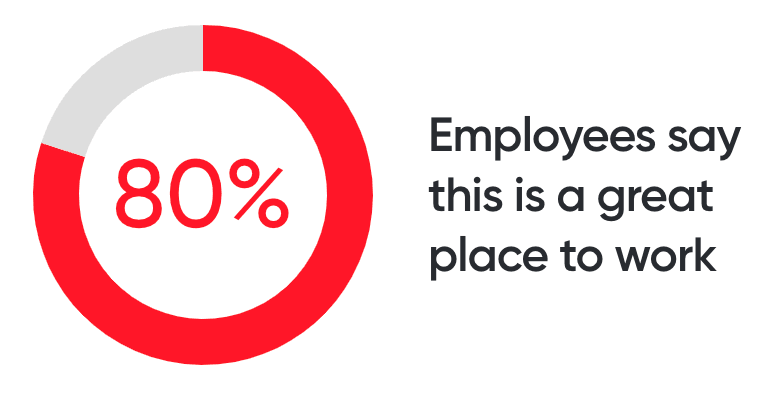

Company Overview
ABOUT THE COMPANY


Immanuel Lutheran Communities is the only Life Plan Community in northwest Montana serving the older adult population. As a not-for-profit LPC, we offer retirement choices that embrace a philosophy of dignified care for the whole person. Our community offers the full spectrum of care from independent and assisted living, memory care, post-acute care, and skilled nursing. Providing resident-focused care that is professional and compassionate is our main priority, and we serve seniors the way they need to be served: with whatever they need.
Employee Demographics


Company Culture at Immanuel Lutheran Communities
The employee experience below at Immanuel Lutheran Communities, compared to a typical company.
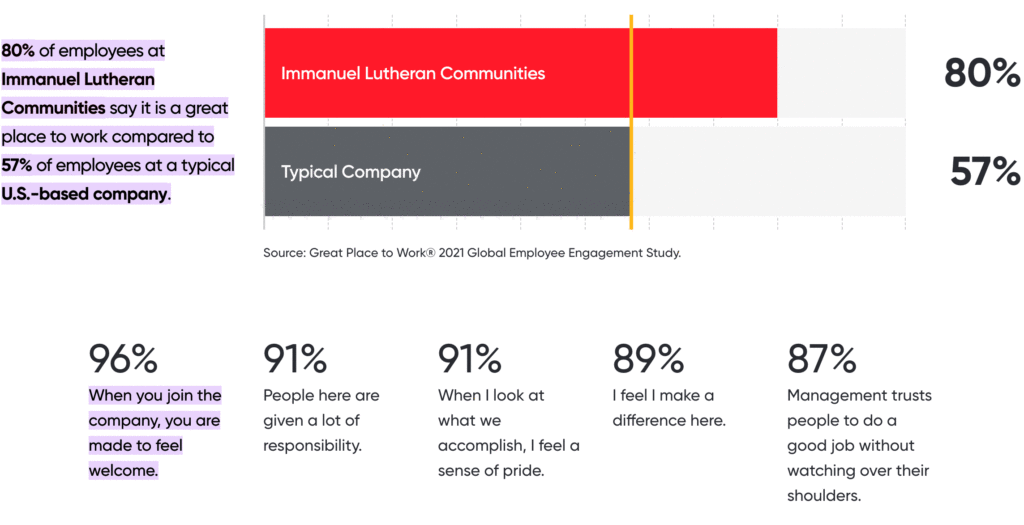

Why Work at Immanuel Lutheran Communities?
See what employees say about what makes Immanuel Lutheran Communities a great workplace. These words are drawn from employee comments on the Trust Index™ survey.



The Alzheimer’s Caregiver Support Group sponsored by Immanuel Lutheran Communities resumed meetings this month. These meetings provide support for those who care for or about someone experiencing Alzheimer’s disease, dementia, or any related disorder that affects memory, reason, and judgment.
Today, the Alzheimer’s Caregiver Support Group Meeting resumed with monthly meetings. The support group meets every third Monday of the month, from 3:00 PM – 4:30 PM, at Buffalo Hill Terrace, 40 Claremont St, Kalispell, Montana, 59901.
The Lodge Resident Care Coordinator, Tammy Miciewicz, and Social Worker, Ben Dorrington, are hosting the support group meetings. Mrs. Miciewicz and Mr. Dorrington’s provide expertise and support to dementia-related caregivers.
By Abby Schneiderman, Adam Seifer, and Gene NewmanJanuary 1, 2021|Money & Policy
Editor’s note: The founders of Everplans, a tech company that helps people with estate planning, have now written a useful book: “In Case You Get Hit By a Bus: How to Organize Your Life Now for When You’re Not Around Later” (Workman Publishing; Copyright © 2020). Here’s an excerpt with essential, practical advice about creating a Digital Estate Plan, so your wishes for your digital accounts are carried out after your death.


What happens to all your digital accounts, services and property after you die? The official name for all these is a Digital Estate Plan. And with the lines increasingly blurred between our on- and off-line lives, it’s more important than ever to have a plan for your digital holdings.
With one in place, all your digital accounts and services can be deleted, managed or transferred to someone else after you’re gone. You can also ensure all paid or recurring services are closed and not draining money from your bank account or racking up credit card debt. Finally, a plan will provide guidance and direction about what you want done with your digital assets and overall online presence.
In the same way you need to organize your physical possessions, if you don’t get a handle on your digital life, you’re leaving a huge mess for your family when you sign off from this world.
Almost all 50 states have passed laws that give a person’s family (or the executor of their estate) the right to access and manage some of their digital assets after they die. Even so, many of the accounts we use on a daily basis are governed by the terms of service or privacy policy of that particular service — such as Gmail, Facebook or Amazon — which still want to determine what should be done with an account after death.
Although Facebook has a Legacy Contact and Google has Inactive Account Manager, those suppose you take the time to get your digital affairs in order ahead of time. Since people don’t often do this, you might need to take things into your own hands. This means sharing passwords and instructions with someone else.
Most of your accounts can be organized into neat categories, but then there are the “mothership” accounts that stand above all the rest.
We recommend getting a password manager so you only need to remember one password and can easily share some or all of your passwords with someone you trust. Otherwise, you’ll need to provide instructions alongside each of your accounts in whatever password storage method you choose.
Not all digital accounts and services are created equal.
The main things to consider for each account you have: the level of importance (if you were to delete it today, how would it affect your life?); single sign-on (do you use the credentials for this account to log in to other accounts?); payment method (is there a credit card, bank account routing number or another form of cash attached to the account?) and ultimate fate (should it be deleted, transferred or do you just not care?).
Most of your accounts can be organized into neat categories, but then there are the “mothership” accounts that stand above all the rest because they provide multiple services and play by their own set of rules. They are:
If someone needed to reset a password to gain access to an account that bills you, Gmail is likely where it would go down. If you don’t want your email to be read, you can use Google’s Inactive Account Manager option. Other Google services include Google Drive, Chrome and YouTube. You can identify all its services associated with your account when you log in and view the page myaccount.google.com.
You can see why granting someone access to your account and telling them what you want done with it after you’re gone could be the most important aspect of your Digital Estate Plan.
Google’s Inactive Account Manager is a post-death solution based on your level of inactivity. You can set that from three months to a year and a half. If you don’t access any of Google’s services within that time frame, Google sets off a series of events that will delete your entire account or share it with someone you named as a “trusted contact.”
It’s become a major source of single sign-on when you use Facebook to log in to other sites so you don’t have to create a new set of credentials.
Memorializing a Facebook account after death has become a standard practice. Anything the deceased posted is still visible and, depending on their account settings, a “Remembering” badge is added to the profile and friends can still add memories and comment on their wall. If a Legacy Contact was appointed, that person can update the main photo, respond to friend requests and include a pinned post at the top of the profile. They can’t access any direct messages, which are kept private.
If you want to remain virtually visible to the world, take the memorialization and Legacy Contact path. If you want your account deleted the way Facebook suggests, name a Legacy Contact and select the option that you want your account deleted.
Amazon
Amazon has found a way into almost every aspect of our lives including streaming (Prime Video), music (Amazon Music), digital books (Kindle) and more.
If you’ve been building a substantial library of digital books, you might want to keep the account alive either by having someone take it over or removing any payment options and keeping it dormant to access those purchases.
Before you delete an Amazon account, be aware of the implications. Any canceled credit cards will need to be updated to prevent a disruption in service.
Apple
If you’ve got an iPhone, MacBook, iPad, Apple Watch or AppleTV and use any of the company’s services (iCloud, Safari browser, Apple Music…) you’ll want to follow a route similar to the one you did with Amazon.
The Apple ID is digital gold and grants access to all of these services. Anyone who might be taking control of your iKingdom needs the username and password, as well as the associated email account (to update or reset the password) and the access code to the iPhone (if two-step verification is enabled).
Don’t delete or transfer on a whim; once an Apple account is closed or inaccessible, it’s almost impossible to get it back.
Microsoft
Microsoft has Outlook.com (formerly Hotmail.com), Office, Skype, Xbox, LinkedIn and other services. The Microsoft ID (formerly known as Passport) consolidates every Microsoft service. A person with this will have full access to all the services you have.
If you pay for a LinkedIn Premium account, you’ll want it cancelled. If you pay for an Office 365 subscription or an Xbox Live account, you’ll have to make arrangements for those, too. Otherwise, you can either have someone take them over by changing the email and payment options or let them all disappear into the abyss.
A Few ‘Final’ Words
Once you’ve identified what you want done with all the accounts that matter, you need someone who’ll make the instructions you leave behind a reality. That’s your Digital Executor. Appoint this person in your will or make it clear to your executor that they’re also responsible for your digital accounts and assets.
Don’t include passwords or what you want done with your digital accounts in your will. A will is a public document and you don’t want this private information floating around for identity thieves to steal. All the instructions you leave behind should be in a separate place.
(Excerpted from In Case You Get Hit by a Bus: How to Organize Your Life Now for When You’re Not Around Later by Abby Schneiderman, Adam Seifer and Gene Newman; Workman Publishing, Copyright © 2020.)
Originally appeared on nextavenue.org
By Paula Spencer Scott | January 27, 2021 | Health
“You don’t look like you have Alzheimer’s,” people tell Terry Montgomery. “Well, that’s like saying, ‘You don’t look like an alcoholic,’” she says. “I’m just not as cognitively sharp as I used to be.” Montgomery, 63, was diagnosed with young-onset (also called early-onset) Alzheimer’s five years ago.
“I don’t look any different or talk different. I’m not deaf, so you don’t have to shout. I understand English,” adds the retired businesswoman of Duluth, Ga., who’s now on the advisory board of Dementia Action Alliance. “I hate the stigma placed on us because people don’t know any better. Once I met others like me, it took away my fear and phobia.”
People diagnosed with Alzheimer’s or other forms of dementia often hear outdated or simply wrong beliefs about their conditions, says Mayo Clinic behavioral neurologist Dr. Jonathan Graff-Radford. He tackles such myths and more in the new “Mayo Clinic on Alzheimer’s Disease and Other Dementias” (written with Angela Lunde), a complete revision of a 2013 guide by Dr. Ronald C. Petersen. The update adds personal stories from people with dementia and their care partners as well new sections on brain health and living well with cognitive disorders. Among the misconceptions it’s time to toss:
Dementia is a problem for the old
Not exclusively, as Montgomery, who got diagnosed at 58, knows. Almost a quarter-million Americans are living with young-onset Alzheimer’s (developing symptoms before 65), which is why the Mayo book now includes a section on it. Another type, frontotemporal dementia, typically strikes between 40 and 65.”A lot of information focuses on those in their 70s. But people in their forties, fifties, and sixties may still work or have dependents living in the house, with different concerns,” Graff-Radford says.
If you have memory loss, you probably have dementia
It’s more apt to say, if you have memory loss, you’re human. Everybody forgets things; young adults blame sleep or stress and move on. Older adults are more apt to make the leap right to disease.”As folks age, it’s natural to have forgetful moments — losing your keys, trouble connecting a name with a face, coming up with a word on the spot,” Graff-Radford says. “There’s a cognitive spectrum, a wide continuous range with many shifting levels between just ‘normal’ or ‘abnormal.’”“Dementia teaches you to enjoy life.”
About 10% to 15% of cases of mild cognitive impairment (changes in thinking and memory beyond what would be expected by aging alone) transition to dementia every year. Dementia is daily memory loss that impacts the ability to function independently, like cook or balance the checkbook. Even this kind of memory loss can have reversible causes, including medications and sleep apnea.”You don’t go right from memory trouble to dementia,” Graff-Radford says.
Alzheimer’s and dementia are the same thing
“If I tell someone, ‘You have dementia,’ they say, ‘But not Alzheimer’s, right?’” Graff-Radford says. “Or if I say, ‘You have dementia due to Alzheimer’s disease,’ people look confused and ask, ‘What’s the difference?’”
Dementia, he explains, is the umbrella term for a syndrome of memory loss and other cognitive changes that interfere with everyday life. Alzheimer’s is the most common type of dementia. Other types of dementia include frontotemporal degeneration, Lewy body dementia, and vascular cognitive impairment.People with dementia can’t learn new things
Actually, people living with dementia can continue to learn new routines, skills, and habits, Graff-Radford says, thanks to procedural memory, a type of long-term automatic memory that tends to be preserved well into the course of the disease. Motor memory, a.k.a. “muscle memory,” can preserve ingrained abilities (ride a bike, tie a shoe) and through repetition, aid the ability to pick up new ones (painting, dancing, trying new exercises). Dementia doesn’t shut down every thinking skill involved in learning.
People with dementia lose the ability to enjoy themselves
“Nothing could be farther from the truth,” Graff-Radford says. Very few patients are diagnosed so late that there isn’t plenty of their same pre-diagnosis life ahead. “We always ask patients, ‘What are the things that bring you joy?’ It’s critical to try to enjoy usual activities, realizing you may need to make modifications,” says Graff-Radford. A gardener may need to use photos to help remember plantings or a bridge player could have someone else keep score while finding the same pleasure in the activity. ” I’d say dementia teaches you to enjoy life,” adds Montgomery. “All the filters, the things I was afraid of, are removed when you focus on the present moment.”.
To diagnose Alzheimer’s, get ‘the Alzheimer’s test’
There’s no single diagnostic test for Alzheimer’s — not yet. (No, those brief cognitive screens that ask you to draw a clock can’t tell you if you have dementia.)
At Mayo, as elsewhere, doctors evaluate possible dementia by considering symptoms, medical history and relatives’ perceptions. Mayo staffers also perform several kinds of neurological tests to check cognitive functions and typically use blood tests and brain imaging to rule out other causes.
“There have been a lot of breakthroughs recently in terms of tests to measure the toxic proteins that build up in the brain through PET scans and spinal fluid, or now plasma as well,” Graff-Radford says. Given that Alzheimer’s starts in the brain 15 or more years before symptoms appear, these biomarker tests may one day identify the disease much earlier.
Dementia makes people more violent
Aggression is far from universal. “Everyone’s journey is very different, with symptoms that depend on them as individuals, on the setting they’re in, and on the anatomy of the disease,” Graff-Radford says.
As “Mike,” a 52-year-old Mayo patient quoted in the book, says, “Please remember that dementia is a disease, not a personality trait.”
Nothing can be done about it — so why find out?
The sooner a diagnosis is made, the more opportunity for treatment, Graff-Radford says.
Current therapies, including medications, can’t reverse symptoms but may slow progression. Coexisting conditions that may make dementia worse, from vitamin deficiencies to sleep apnea, can be treated.
While cognitive changes are still mild, a person can also plan for how and where they’d like to live as symptoms progress. Many of Graff-Radford’s patients choose to emphasize relationships and cultivating a sense of life purpose, he adds.
Far from being an exercise in futility, finding out the cause for concerning symptoms is “empowering,” Graff-Radford says. “Having dementia is just one part of who I am. It does not define me,” says “Dale,” another Mayo patient. “I can enjoy today and what I have now.”
Paula Spencer Scott is the author of more than a dozen books, including Surviving Alzheimer’s: Practical Tips and Soul-Saving Wisdom for Caregivers, a series of interactive journals and health/family guides with doctors at Harvard, UCLA and Duke. Her latest is When Your Aging Parent Needs Help with Dr. Leslie Kernisan. A longtime journalist and former Woman’s Day columnist, she’s also an Alzheimer’s, caregiving, and brain-health educator.
Originally appeared on nextavenue.org
Press Release

